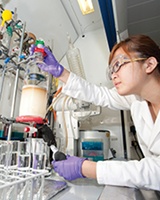Scanning the human barcode: DNA tests aid faster diagnosis
25 Apr 2013
Southampton researchers are developing an innovative technique for DNA testing that is paving the way to point-of-care tests for medical conditions and faster crime scene analysis.
 The ability to diagnose disease and identify people from the DNA sequence of their genome has revolutionised medicine and forensic science. However, the time-consuming nature of this type of test causes problems when the results are needed quickly. Southampton researchers are leading the way in developing super-fast DNA tests.
The ability to diagnose disease and identify people from the DNA sequence of their genome has revolutionised medicine and forensic science. However, the time-consuming nature of this type of test causes problems when the results are needed quickly. Southampton researchers are leading the way in developing super-fast DNA tests.
In partnership with international analytical science company LGC, Southampton researchers have developed a new way of fluorescently labelling DNA with special probes, known as HyBeacons. ''HyBeacons are like little balls of loosely screwed up string that uncoil easily and find their targets,'' says project leader Tom Brown, professor of chemical biology.
The HyBeacons light up when they attach to a specific target sequence of DNA. Their advantage over existing systems is their very simple structure, which makes them more predictable: they bind faster to their targets and always work. ''In theory you could diagnose any infectious or genetic disease by using HyBeacons on the DNA sequence of bacteria, viruses or people,'' says Tom.
Towards faster diagnosis
Brown's team is currently developing a fast test for chlamydia, a common sexually transmitted infection (STI) that is becoming a big problem, particularly in the western world. Chlamydia can usually be treated with antibiotics – but only a quarter of women and half of men with the condition show any symptoms, so most people are unaware that they have the infection and so continue to spread it. If left untreated, chlamydia can lead to long-term painful infections in women that result in infertility. Ectopic pregnancy is a life-threatening condition that has also been linked to prior chlamydial infection.
Despite these serious complications, many patients who have tested positive for chlamydia don't return for their results. ''Previous studies have shown that up to 40 per cent of people diagnosed with chlamydia did not return for treatment,'' says Ian Clarke, Professor of Molecular Microbiology at the University of Southampton. ''This obviously increases the risk of passing on this infection, so it would be far better for diagnosis and treatment to occur at the same visit to a clinic.''
To address this issue, Southampton researchers led by Ian, in partnership with LGC and Optigene – a company that manufactures systems for analysing DNA – are designing a chlamydia test that aims to produce results within 15 minutes. Having secured £480,000 of funding from the Engineering and Physical Sciences Research Council (EPSRC) and the UK's Technology Strategy Board, they are developing the new test using HyBeacons to detect the presence of the Chlamydia bacterium in urine samples.
In the future doctors could use this type of test to diagnose several different bacterial infections from one sample, which would be particularly useful for diagnosing STIs, as they often occur at the same time.


















